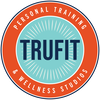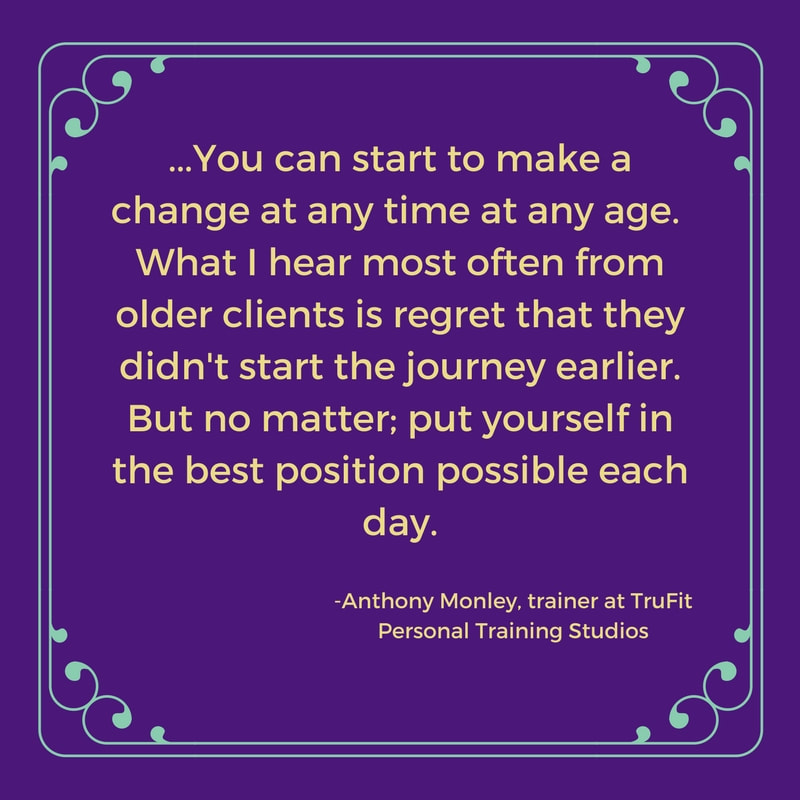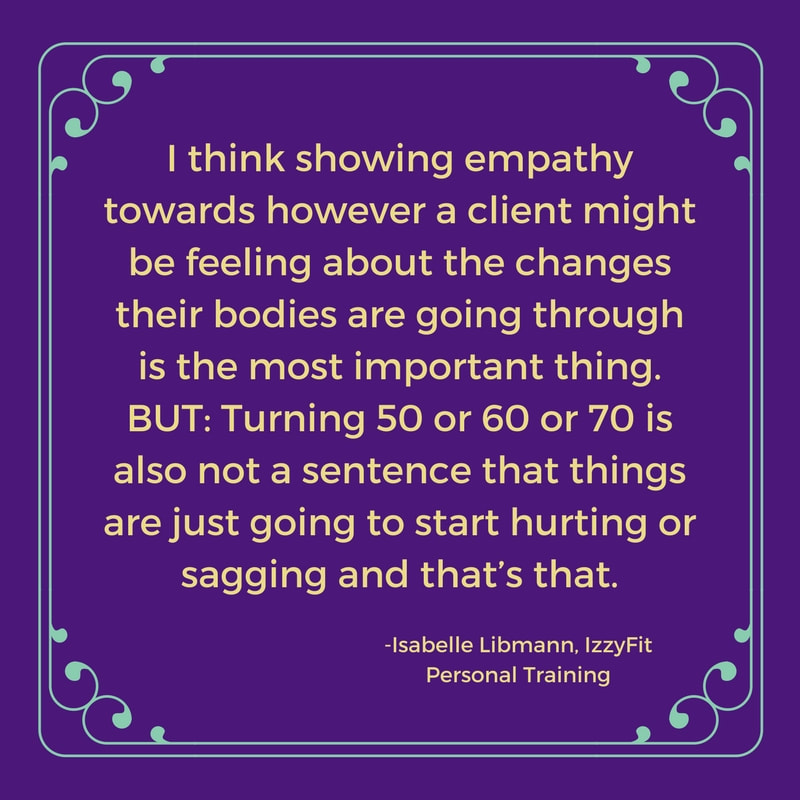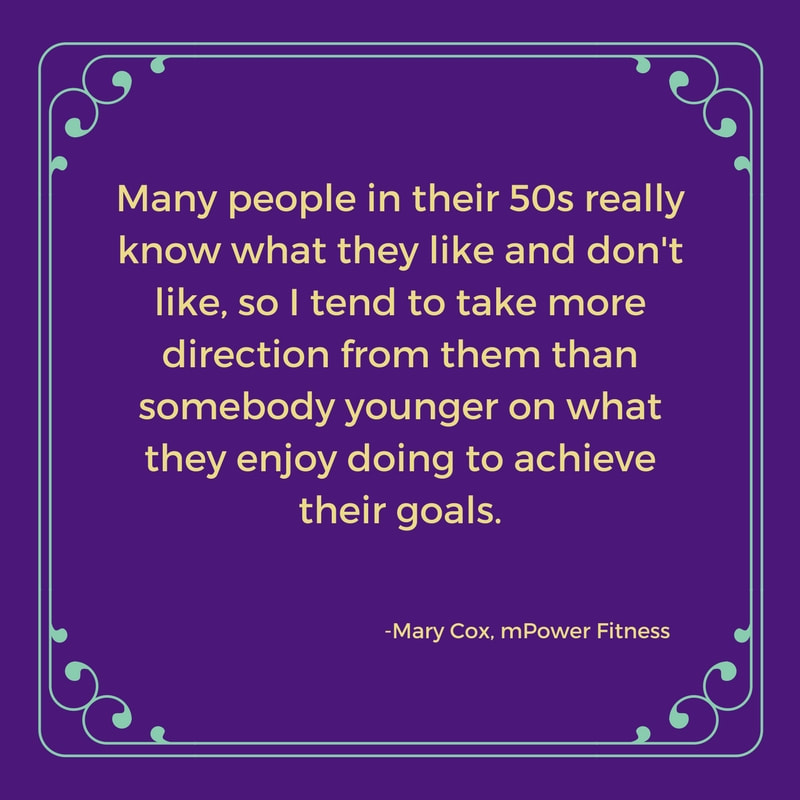|
When my mom was looking for a personal trainer out in Pennsylvania after surgery from a disk herniation, I had the good fortune of getting a referral from none other than Lou Schuler (co-author of The New Rules of Lifting For Women) because he lives in the same town. I wanted to make sure she was placed with someone who obviously had the credentials but would also listen to her and her needs, her qualms and would program appropriately for her. I mean, she’s my mom and I only wanted the best! But if you don’t happen to live near Lou, I thought a few of us from TruFit could talk about things to look for when hiring a personal trainer after 50 so you, too, can age like a badass in a safe way. Here goes! -Izzy What should clients over 50 look for when hiring a trainer? What questions should they ask us? Mary Cox: “Have you worked a great deal with individuals in this age group?” “How do you create plans for your clients?” I would be looking for a trainer that doesn't feel intense, who isn’t going to push me off a cliff and out of my comfort zone without getting me there first. Get to know a trainer by asking them why they got into the business and what are the top 3 joys in their job. Anthony Monley: Ask for the trainer's training philosophy. It's a good general question that can point you to inexperience and/or help you to see if you align on general values. You can never know for sure how you'll gel together but it's a good starting point. In addition to this, I'd ask directly if they have clients in that age range and if they felt comfortable with that clientele. Kathryn Lehner: They should look for someone who will keep in mind their age, injuries, and potential life restrictions. It depends on the person, but generally focusing on ways to make their everyday life easier is the main focus. Izzy Libmann: I would want to make sure you feel listened to and taken seriously. If a trainer doesn’t ask if you have any concerns or fears about starting a strength training program and you DO, tell them! And if you get the sense those feelings are being minimized: Run! As trainers, how might you train someone over 50 differently than their younger counterparts? Anthony: I think the obvious answer is to account for age/injuries/arthritis/etc, but a big component that gets overlooked is the psychological approach to training this age group. Often they are coming to the gym with long-held fears/issues/insecurities. They can even feel fragile. With younger clients (especially athletes), you can all but point and they do. With older clients, I think it's important to start slowly and push the line firmly but carefully forward, let them know they're improving, point out how far they've come since they started, and keep them from limiting themselves--remove the psychological constraints and preconceived notions of what someone of a certain age can or can't do. Many times the struggle isn't with their aging bodies but with their mindset. Mary: Many people in their 50s really know what they like and don't like, so I tend to take more direction from them than somebody younger on what they enjoy doing to achieve their goals. I tend to also take it a little slower because many of my clients in this age range have experienced pain or discomfort from imbalances and they are timid. Educating them, too, on how these imbalances might be affecting some pain is important. Kathryn: I would focus more on balance and stability work over getting the heart rate up as high as it can for as long as it can. Obviously it depends on the person, but typically balance and stability are key features of a training session. Izzy: I am WAY more aware of the risk to reward ratio. I’ll spend a lot more time on movement prep than I may otherwise. I may know a client is physically ready to do something more challenging than they’ve been doing but will let them decide when they’re ready to do it. What might be more important for the over 50 crowd to take into consideration training at their age than before? Is there stuff they should be doing more of/less of? Mary: I think strength training more than 1x a week is very important, whether it is with a trainer, class or at home. I also recommend a yoga class once a week. Kathryn: Stability work, balance, whole body strength but specifically leg strength to be able to still walk up a flight of stairs effortlessly, or to pick up your feet so you don't shuffle as you walk, or to pick up a grandchild without hurting your back. Anthony: If it's been a long time since they've been in the gym (or not at all), they need to take the time to ready themselves for workouts (nutrition/water) and stay on top of inflammation/etc after (ice, stretching). You don't have the benefit of a young body that can bounce back without extra and specific care. In general, I stay away from high-impact movements with the ground (tons of jumping, etc). In my experience, the knee problems are almost automatic when I veer too far from this. Izzy: Identifying where you might have an imbalance or a poor movement pattern is also important (and this would stand for anyone at any age, really, but if those imbalances have never been addressed in 50+ years, it’s even more important to address it now). Daily patterns like breathing, walking, sitting (squatting) and picking things up (deadlifting) are usually pretty ingrained; working on creating a solid foundation before getting to the more “exciting” stuff is more important than working out on top of disfunction. How can we help our clients manage expectations as their bodies change? Izzy: I think showing empathy towards however a client might be feeling about the changes their bodies are going through is the most important thing. BUT: Turning 50 or 60 or 70 is also not a sentence that things are just going to start hurting or sagging and that’s that. It stinks that, when an ache or pain or, worse, injury comes up, it might take longer to feel better but it’s also not destiny. It might take work to undo some less-than-helpful habits that have existed for decades (be they lifestyle or movement) but it is possible! It might just take a little longer. Anthony: Honestly I think it's the opposite of most younger clients, where you have to temper what they believe is possible in a short amount of time. With older clients, I'm often telling them this and that IS possible, and that you can still get real results at any age. Mary: I think it is always important to find out what the client is willing to commit to to reach their goals. I also like to focus on the increase in strength and often balance and flexibility. Kathryn: Posture is incredibly important! Focus is on overall stability, mobility and living a pain-free life. Anthony: In general, you can start to make a change at any time at any age. What I hear most often from older clients is regret that they didn't start the journey earlier. But no matter; put yourself in the best position possible each day.
0 Comments
Your comment will be posted after it is approved.
Leave a Reply. |
Archives
April 2024
Categories! |




 RSS Feed
RSS Feed